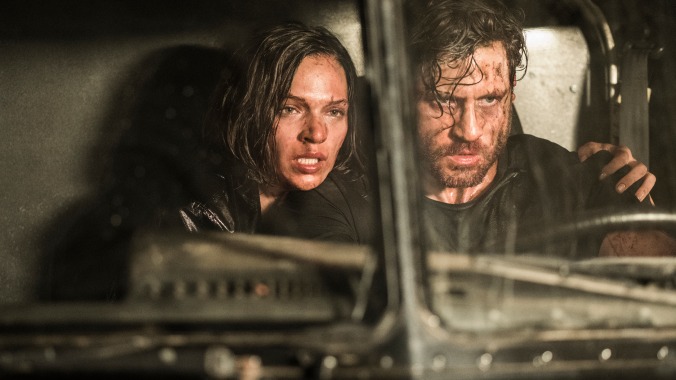The Last Days Of American Crime is a bloated sci-fi heist movie from the director of two Takens


Olivier Megaton, the French action-movie director with the impossibly perfect self-chosen name, is best known for his team-player contributions to Luc Besson’s once-prolific EuropaCorp. Specifically, he’s the auteur behind the internet-famous moment from Taken 3, where around a dozen cuts are utilized to depict Liam Neeson hopping a fence. With The Last Days Of American Crime, Megaton has parted with EuropaCorp and cleaned up his act—or at least his edits. The action is cleaner, clearer, and less jittery; the stylized cinematography has plenty of backlighting, lens flares, and red glow, but looks composed rather than frenzied. Instead of cutting his work into a blur, Megaton finds another path to overkill: distending a B-movie plot into a straggly 150-minute epic of double-crosses and dubiously sourced explosions.
Yet even with a full two and a half hours at its disposal, The Last Days Of American Crime still opens with paragraphs of narrated exposition. Some of it is in the fine B-movie tradition of expediently laying out a ridiculous but tantalizing premise: The United States is on the brink of rolling out the “American Peace Initiative,” a signal beamed across the country that inhibits people from knowingly committing any crimes. This looming deadline has hastened a dystopia somewhere between The First Purge and Minority Report, as citizens run wild with the knowledge that in a few days they’ll be physically unable to set fires, shoot people, or dance topless on top of parked cars.
The movie doesn’t make clear where, exactly, in the neurochemical process the signal takes effect, or whether it requires an extensive knowledge of legal minutiae for full effectiveness. This vagueness might not matter if the story moved along without bogging itself down in less interesting details, like the backstory of Graham Bricke (Edgar Ramírez), a career criminal whose brother has recently died in prison. Bricke is approached by Kevin Cash (Michael Pitt), the wayward son of another career criminal, who proposes a daring last-minute heist. Cash’s girlfriend, Shelby Dupree (Anna Brewster), positioned as a Besson-style supermodel/assassin but who is actually an expert hacker, will block the API signal just after it goes online, creating a window just long enough for Bricke and Cash to make off with a billion dollars and change and head to sweet Canadian freedom.
The film (or maybe the graphic novel source material) betrays a bizarre lack of confidence in its own logline by insisting that the characters must have motivations beyond money and the ticking clock of indefinite government control. For Cash, it’s a chance to step out of his father’s shadow; for Bricke, it’s supposed to count as revenge for his brother, a character who has roughly one minute of screen time before he’s dispatched to create a hollow rooting interest. Rarely have movie criminals seemed so woefully unfamiliar with the well-worn concept of one last big score.
For reasons beyond comprehension, Megaton has been afforded the opportunity to really luxuriate in his characters and atmosphere before the heist kicks into gear. The only actor who tries to take full advantage of this baggy screen time is Pitt. Looking and sounding a little like Jason Mewes, his every gesture, hesitation, repetition, and aside has the affect of a long showpiece monologue from a colorful side character who gets shot in the head after one scene. It’s not an especially funny or even coherent performance, but it livens up a movie where the rest of the acting consists largely of hollow-eyed bearded dudes glowering and/or screaming. Brewster is also marginally compelling for this reason, but she’s often stuck playing scenes opposite Ramírez, whose big moves here are staring dolefully and bleeding.
Don’t blame the actors, though, either for indulging themselves or checking out. When guns aren’t firing and tires aren’t screeching, the screenplay is a stew of garbled dialogue (“If this gunshot doesn’t kill me, your driving is”), questionable metaphors (the government is apparently “playing Jesus with people’s brains”), and ham-fisted commentary (whoa, did that sleazy criminal just switch his career to banking?!). The movie’s approach to the latter is embodied by Sharlto Copley, who plays a policeman in a dead-end subplot. His usual overacting freezes with uncertainty over whether he’s a delusional, overzealous lawman or a victim of government overreach, and the movie concludes by bravely asking, “Who cares?” Obviously it’s not fair to expect a movie to engage with current events as they unfold months after it was completed, but the filmmakers’ ideological muddle reads as cynically opportunistic as any of the actual characters.
In its final hour, The Last Days Of American Crime finally gets down to the business of its big heist, revealing both the propulsive entertainment value the filmmakers have been inexplicably stalling and the thinness of the whole enterprise. A late-going implication that the API could turn nihilism into a kind of superpower isn’t much of a twist in a movie where almost everyone already seems more or less amoral. Cash tries to telegraph this when he offers another jumbled maxim earlier on: “Sometimes you get to see the bullet that has your name on it. Sometimes everything is just bullshit.” Yeah, sometimes.